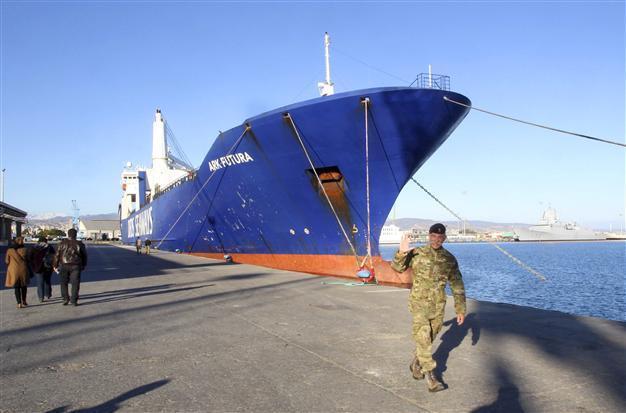Experts agree naval plan for Syria disarmament: Russia
MOSCOW - Agence France-Presse

One of two cargo ships intended to take part in a Danish-Norwegian mission to transport chemical agents out of Syria docks in Limassol, December 14, 2013. REUTERS photo
Russia said on Friday that international experts have agreed a plan for shipping Syria's most dangerous chemical weapons to Italy for their eventual destruction aboard a US ship.
Moscow hosted talks between representatives of the Organisation for the Prohibition of Chemical Weapons (OPCW) and disarmament specialists from countries including Syria and the United States aimed at finalising a plan for removing the war-torn country's chemical arms.
The US-Russia deal for Syria to surrender its stash of more than 1,000 tonnes of deadly agents averted Washington-led strikes this summer aimed at punishing President Bashar al-Assad for a chemical weapons attack that killed hundreds and which the West blamed on the regime.
Russia has accused Syrian rebel forces of staging the August 21 strike near Damascus.
A top Russian negotiator said Friday's talks in Moscow resulted in general agreement about how the arsenal can be shipped out from Syria's Latakia port via Italy to the specially-equipped US ship Cape Ray.
"Everything went well," ITAR-TASS quoted the Russian foreign ministry's security and disarmament department head Mikhail Ulyanov as saying.
"We reached an understanding about how we are going to cooperate in Syrian territorial waters during the process of moving the chemicals from the port of Latakia to international waters." Several nations have already announced their offers of help.
A Danish and a Norwegian frigate are waiting in Cyprus to escort Nordic cargo ships to collect the chemicals from Latakia.
The Nordic vessels will take the most dangerous chemicals to an Italian port. These will then be loaded aboard the US Navy's Cape Ray vessel for their destruction in international waters.
Norway's ships will then return to Latakia to pick up the remaining chemicals so that they could be destroyed at commercial facilities outside Syria.
The most hazardous materials still remain scattered around 12 sites in Syria and the international effort will most likely fail to meet its deadline of removing these Category One agents by the end of the month.
Russia this month air-lifted 75 vehicles and other equipment to Syria to help move the agents to the country's main port.
